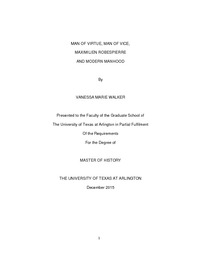
ATTENTION: The works hosted here are being migrated to a new repository that will consolidate resources, improve discoverability, and better show UTA's research impact on the global community. We will update authors as the migration progresses. Please see MavMatrix for more information.
Show simple item record
| dc.contributor.advisor | Reinhardt, Steven G. | |
| dc.creator | Walker, Vanessa Marie | |
| dc.date.accessioned | 2017-02-14T15:30:17Z | |
| dc.date.available | 2017-02-14T15:30:17Z | |
| dc.date.created | 2016-12 | |
| dc.date.issued | 2016-09-15 | |
| dc.date.submitted | December 2016 | |
| dc.identifier.uri | http://hdl.handle.net/10106/26363 | |
| dc.description.abstract | Since his death in 1794, Maximilien Robespierre’s legacy has been debated
by scholars and non-scholars alike. Some have called him a blood-thirsty dictator
who used his political power to execute innocent citizens who crossed him while
others have called him the living embodiment of the French Revolution. This study
will examine Robespierre using the lens of gender. The French Revolution was not
just a time of great social and political upheaval; it was a time in which concepts of
masculinity were transitioning from a focus on aristocratic honor and male beauty
to bourgeois sensibilities. Through his belief in restraint in a man’s personal life—
including moral behavior, religion, and relationships with women—loyalty to the
Revolution, and the willingness to sacrifice one’s life, Robespierre serves as a
model of the transition of masculinity that resulted from the French Revolution. | |
| dc.format.mimetype | application/pdf | |
| dc.language.iso | en_US | |
| dc.subject | French Revolution | |
| dc.subject | Robespierre | |
| dc.subject | Masculinity | |
| dc.title | Man of Virtue, Man of Vice: Maximilien Robespierre and Modern Manhood | |
| dc.type | Thesis | |
| dc.degree.department | History | |
| dc.degree.name | Master of Arts in History | |
| dc.date.updated | 2017-02-14T15:30:17Z | |
| thesis.degree.department | History | |
| thesis.degree.grantor | The University of Texas at Arlington | |
| thesis.degree.level | Masters | |
| thesis.degree.name | Master of Arts in History | |
| dc.type.material | text | |
| dc.creator.orcid | 0000-0003-0360-2333 | |
Files in this item
- Name:
- WALKER-THESIS-2016.pdf
- Size:
- 888.1Kb
- Format:
- PDF
This item appears in the following Collection(s)
Show simple item record


